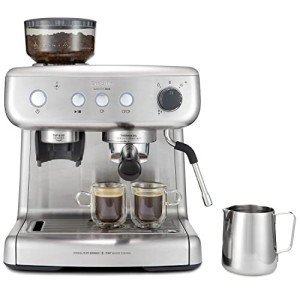The World of High-Quality Espresso Machines: A Comprehensive Guide
Espresso has actually become a beloved drink among coffee lovers worldwide, known for its abundant taste, intense scent, and versatility. The heart of a great espresso lies in the machine utilized to brew it. High-quality espresso machines are developed to deliver the perfect shot, making them a vital investment for coffee lovers. This post checks out various types of high-quality espresso machines, their features, upkeep suggestions, and responses to frequently asked concerns.
Types of High-Quality Espresso Machines
High-quality espresso machines fall into a number of categories, accommodating different preferences, skill levels, and spending plans. The main types consist of:
| Type of Machine | Description | Perfect User |
|---|---|---|
| Manual Espresso Machines | Requires user skill to manage extraction and pressure. Provides the most control over the developing process. | Experienced baristas and enthusiasts |
| Semi-Automatic Machines | Integrates manual operation with automation. Users manage the grind and tamping, while the machine manages water dispersion. | Intermediate users |
| Automatic Espresso Machines | Automate the developing procedure, permitting programmable brewing times and temperatures. | Casual coffee drinkers |
| Super-Automatic Machines | Have integrated grinders and are totally automated, handling whatever from grinding to brewing and steaming. | Users seeking convenience |
| Commercial Espresso Machines | Designed for high volume use in cafes and dining establishments, offering resilience and speed. | Service owners |
Comprehensive Overview of Each Type
Manual Espresso Machines
- Pros: Complete control over the developing process; can produce exceptional quality espresso.
- Cons: Requires substantial skill; time-consuming.
Semi-Automatic Machines
- Pros: Balanced control, blending manual and automatic processes; exceptional quality espresso is still attainable.
- Cons: Requires some knowledge and experience to master.
Automatic Espresso Machines
- Pros: User-friendly; decreases the learning curve while still producing high-quality espresso.
- Cons: Still needs some understanding of coffee-making essentials.
Super-Automatic Machines
- Pros: Maximal benefit; little skill required; perfect for individuals or households who desire coffee without difficulty.
- Cons: Higher price point; may lack the fine-tuning abilities of manual machines.
Commercial Espresso Machines
- Pros: Built for longevity and performance; typically consists of functions for high-volume turns.
- Cons: Expensive; might be overkill for home use.
Key Features to Consider
When searching for a high-quality espresso machine, several key functions need to be taken into consideration:
- Pressure and Pump Type: Look for machines with at least 9 bars of pressure, which is vital for extracting the best taste from coffee beans.
- Boiler Type: Single, double, and heat exchanger boilers each impact how the machine carries out and the speed of developing.
- Develop Quality: High-quality products such as stainless-steel are more suitable for toughness and aesthetic appeals.
- Reduce of Use and Cleaning: Some machines require extensive cleansing, while others are developed for simple upkeep.
- Temperature Control: Consistent temperature level is vital; think about machines with PID controllers for exact control.
Advantages of High-Quality Espresso Machines
Purchasing a high-quality espresso machine offers a multitude of advantages:
- Superior Quality: High-end machines enable higher control, causing tastier espresso.
- Sturdiness: Built to last, quality machines require less repairs and replacements.
- Customization: Users can delight in a tailored experience by adjusting grind size, shot timing, and other settings.
- Increased Convenience: Automatic and super-automatic alternatives permit aficionados to take pleasure in espresso with minimal effort.
Maintenance and Care for High-Quality Espresso Machines
To keep an espresso machine working optimally, regular maintenance is crucial. Here are suggestions for keeping a high-quality espresso machine:
Descale Regularly:
- Use a descaling solution every few months to avoid accumulation of minerals from water, which can impact flavor and performance.
Tidy the Brew Group:
- For machines with a removable brew group, clean it frequently to guarantee a tidy extraction.
Change Water Filters:
- Use a water filter and change it as required to reduce pollutants in your developing water.
Daily Cleanings:
- Rinse the portafilter and group head after each use to prevent oil buildup.
Keep an Eye on the Parts:
- Monitor seals, gaskets, and other parts for wear and tear and replace them as necessary.
Regularly Asked Questions (FAQs)
1. What is the best espresso machine for newbies?
For newbies, a semi-automatic machine often provides a good balance of functionality and control, enabling users to find out the abilities required for making great espresso.
2. Are super-automatic machines worth the investment?
Yes, for those who focus on convenience and ease over control, super-automatic machines can be a worthwhile financial investment, especially for families or hectic professionals.
3. Just how much should I expect to invest in a high-quality espresso machine?
High-quality espresso machines range substantially in cost, with manual machines starting at a few hundred dollars, while super-automatic or commercial machines can exceed a number of thousand.
4. Can I make other coffee drinks with an espresso machine?
Yes, many espresso machines have steam wands or accessories that permit users to produce lattes, cappuccinos, and more.
5. How long do espresso please click the following internet site ?
With proper upkeep, high-quality espresso machines can last over a years, making them a long-term investment in your coffee pleasure.
High-quality espresso machines yield a transformative coffee experience, whether taken pleasure in in your home or in a commercial setting. By understanding the types available, their functions, and the upkeep needed to keep them running effectively, customers can make educated decisions that raise their coffee-drinking experience.

